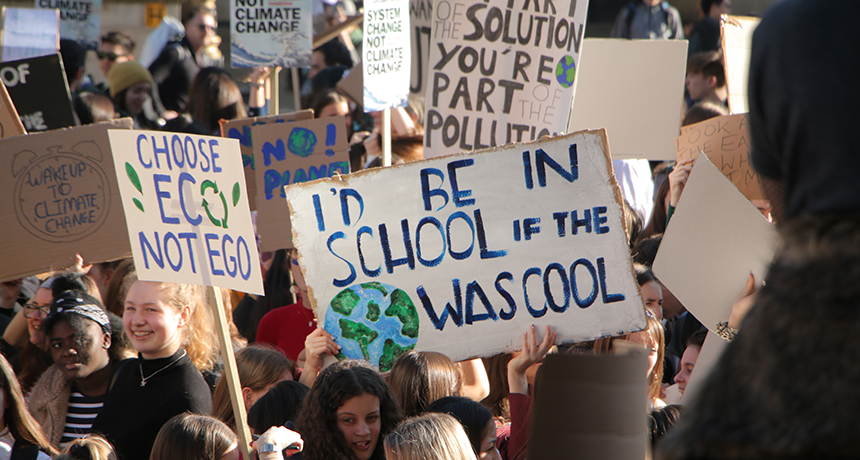Questions for ‘Students strike to spur adults into climate action’

Thousands of students protested in support of climate change action in London, England, on February 15. A global strike is planned for March 15.
Socialist Appeal/Flickr (CC BY 2.0)
To accompany feature “Students strike to spur adults into climate action”
SCIENCE
Before Reading:
1. Describe a political protest. What tends to motivate people to take part?
2. Describe the risks that you feel face you, your town and your nation by climate change. What can you do to encourage action to reduce those risks?
During Reading:
1. According to the story, what big event was planned for March 15, 2019?
2. What got Milou Albrecht interested in the issue of climate change?
3. How big a numerical warming above pre-industrial levels has Earth experienced to date?
4. How is that expected to change by 2030 to 2050? How many years away is that?
5. What health issue has Greta Thunberg had to deal with as she spoke out in front of Sweden’s Parliament and at the U.N. meeting in Katowice, Poland?
6. Give at least four reasons (based on what you read) about why the impacts of climate change can be felt especially hard in developing nations, such as the one in which Nakate Vanessa lives?
7. According to one 2017 report cited in the story, just 100 industrial polluters are responsible for what share of the greenhouse-gas emissions driving climate change?
8. What is the Paris Accord?
9. According to the story, why can knowledge about climate-change impacts affect the physical and mental health of students?
10. Why might taking part in student protests, such as those mentioned in the story, be helpful to some students?
After Reading:
1. If you were going to organize your own event to point out issues related to an issue you find personally important, where would you hold it, whom would you invite to take part, whom would you invite to attend, and when would you hold it? Explain your decisions.
2. Put together a poster that expresses a message you think would catch the eye of adult decision-makers. Include a simple but strong and compelling statement that reflects your concern on this topic.
GEOGRAPHY
1. Go to the map of planned student protest events (https://fridaysforfuture.org/events/map). What parts of the world are most heavily participating? Which nations seem least involved at this point? What might be the reasons behind these trends?
2. Search the map and find the planned event that is closest to where you live. Now identify that place and where you live on a map. How far away are the two sites. If you were to drive to that place by car, traveling no faster than 55 miles per hour (88.5 kilometers per hour), how long would it take you to reach that spot? What if you could travel no faster than 20 miles per hour (32.2 kilometers per hour): How would that affect your travel time in minutes?